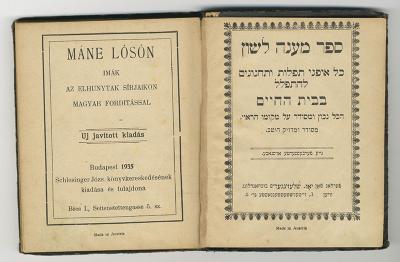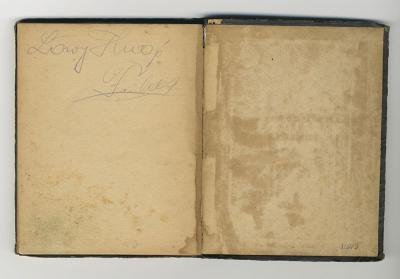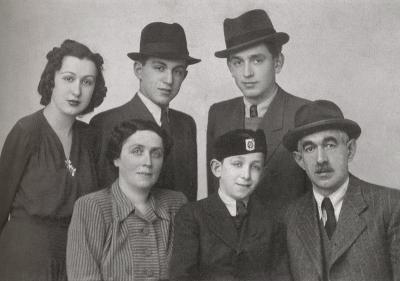In November 1938, Hungary annexed parts of Czechoslovakia including Filakovo, the town where the Lowy family lived – Hugo, Ilona and their children Alex, Edith, John and Frank. Anxiously, they followed the advance of the war from Hungarian territory. In 1942, they were shocked by news of the deportation of their extended family that had remained on the Czechoslovakian side of the border.
At the beginning of 1943, Hugo Lowy moved with his family to Budapest, in the hope that in a larger place they would stand out less. Alex, the oldest, was drafted into the Hungarian labor battalions, and the rest of the family managed as best as they could to make a living until the Nazi occupation of Budapest on March 19th 1944.
The next day Hugo went to the railway station with the intention of buying tickets for the family to return to Filakovo, but didn’t return. A few days later a letter arrived relating that he had been taken with about two hundred others to the Kistarcsa camp. The correspondence between Hugo and his family continued, thanks to a Hungarian intermediary who smuggled the letters in and out of the camp, but in April 1944 the letters from Hugo suddenly stopped, and when news reached Ilona of the first deportations of Jewish men from Hungary, she feared for his life.
Immediately upon hearing of the intention to set up a ghetto in Budapest, Ilona and her children decided to split up. Edith and John obtained false Hungarian papers and went to live under assumed identities. Ilona and the young Frank moved to the ghetto. Thanks to Frank’s resourcefulness, the two obtained permits for the “Glass House”, a building outside the ghetto that was under Swiss protection, and they were able to survive.
After the liberation of Budapest by the Red Army, Ilona and Frank were reunited with John and Edith. They returned to their home where they found most of their belongings intact, including Hugo’s prayer book. Alex, one of the few survivors of the Mauthausen camp, was able to return home.
John and Frank immigrated to Eretz Israel (Mandatory Palestine) as clandestine “Ma’apilim”. Both were deported to Cyprus by British Mandate forces, but as a youth not yet of military age, Frank was released and allowed to immigrate before the State of Israel was established. When the War of Independence broke out, Frank enlisted. John was released in 1949. Ilona and Alex, as well as Edith and her new husband immigrated to Australia, and in the 1950s John and Frank decided to join them.
Only in 1991, as the result of a chance encounter in California between Peter Lowy, Hugo’s grandson and Holocaust survivor Meir Lowy, who had been with Hugo in the Kistarcsa camp, did the family learn of Hugo’s last few months. Meir, who had looked up to the older Hugo as a father figure, related how Hugo had encouraged and supported his fellow prisoners. According to his testimony, the prisoners were deported from Kistarcsa to Auschwitz. Upon their arrival in Auschwitz, Hugo was clubbed to death on the platform by an SS man when he returned to the heap of belongings to retrieve the parcel that contained his prayer shawl and phylacteries.
Yad Vashem Artifacts Collection
Gift of Frank Lowy, Sydney, Australia









